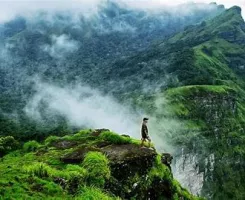Sundarban National Park
Duration
2 to 4 Days
2 to 4 Days
Best time to visit
Sep-Feb
Sep-Feb
Theme
Wildlife, Waterfront
Wildlife, Waterfront
Sundarban National Park Travel Guide
Sundarban National Park, located in India's West Bengal state, is a UNESCO World Heritage Site known for its vast mangrove forests and diverse wildlife. The park is situated where the Ganges River meets the Bay of Bengal, creating a unique ecosystem that supports numerous species of flora and fauna. Sundarban is famous for being the largest mangrove forest in the world and is home to the majestic Royal Bengal Tiger.Top Attractions in Sundarban National Park
- Spotting Royal Bengal Tigers on a thrilling safari
- Cruising through the intricate network of mangrove forests
- Exploring unique bird species like the Masked Finfoot
- Visiting the Sajnekhali Wildlife Sanctuary and Crocodile Park
Sundarban National Park is Famous for
Mangrove forests and Royal Bengal Tigers.Top Attractions in Sundarban National Park
- Spotting Royal Bengal Tigers on a thrilling safari
- Cruising through the intricate network of mangrove forests
- Exploring unique bird species like the Masked Finfoot
- Visiting the Sajnekhali Wildlife Sanctuary and Crocodile Park
What's Great about Travelling to Sundarban National Park?
- Perfect for nature lovers and wildlife enthusiasts
- Unique opportunity to see the Royal Bengal Tiger in its natural habitat
- Experience the tranquility of the mangrove forests
What's Not So Great about Travelling to Sundarban National Park?
- Not recommended for those seeking a luxurious or urban vacation
- Limited accommodation options within the national park
- May not be suitable for travelers with mobility issues due to rugged terrain
Travel Tips for Sundarban National Park
- Obtain the necessary permits and permissions for entry into the national park
- Wear comfortable clothing and sturdy footwear for exploring the forests
- Follow safety guidelines during wildlife safaris and boat rides
Important Sundarban National Park trip information
- Ideal Duration: 2-3 days to fully explore the national park
- Best Time to Visit: November to February for pleasant weather
- Nearby Airports and Railway Stations: Nearest airport is in Kolkata, and nearest railway station is Canning
Top 1 Places to visit in Sundarban National Park
Per Person
19,000
*EXCLUDING APPLICABLE TAXES 5.0 Ratings
( 8 Reviews )
( 8 Reviews )
Per Person
24,400
*EXCLUDING APPLICABLE TAXES Per Person
34,990
*EXCLUDING APPLICABLE TAXES Per Person
18,000
*EXCLUDING APPLICABLE TAXES Per Person
15,000
*EXCLUDING APPLICABLE TAXES FAQ's on Sundarban National Park
Q1: What is the best time to visit Sundarban National Park?
The best time to visit Sundarban National Park is from September to March when the weather is pleasant, and the chances of spotting wildlife, especially the Royal Bengal Tiger, are higher. Avoid the monsoon season (June to August) due to heavy rainfall and the park's closure.
Q2: Do I need a visa to travel to Sundarban National Park?
Tourists visiting Sundarban National Park in India require a valid Indian visa. Make sure to check the visa requirements based on your nationality and plan accordingly. Certain nationalities may be eligible for e-Visa or visa on arrival facilities.
Q3: What are the must-visit attractions in Sundarban National Park?
The must-visit attractions in Sundarban National Park include the wildlife sanctuaries for tiger spotting, bird watching, boat cruises through the mangroves, and exploring local villages to experience the unique way of life.
Q4: Is Sundarban National Park a safe place to travel?
Sundarban National Park is generally safe for tourists, but it's essential to follow the guidelines of the park authorities, especially during boat safaris and jungle treks. Avoid venturing into restricted areas and always travel with a guide.
Q5: What is the local currency in Sundarban National Park and can I use credit cards?
The local currency in Sundarban National Park is the Indian Rupee. While some hotels and larger establishments may accept credit cards, it's advisable to carry cash for local purchases. ATMs are limited, so ensure you have enough cash for your trip.
Q6: What is the local cuisine like in Sundarban National Park?
Sundarban National Park offers delicious seafood dishes like prawn curry, fish fry, and crab masala. Vegetarians can enjoy dishes like dal, vegetable curry, and rice. Be sure to try the local specialty of honey collected from the Sundarbans.
Q7: What transportation options are available in Sundarban National Park?
Transportation options in Sundarban National Park include boat cruises for exploring the mangroves, private taxis for local transfers, and cycle rickshaws for short distances. Public ferries are also available for traveling between islands.
Q8: Are there any cultural norms or etiquette I should be aware of when visiting Sundarban National Park?
When visiting Sundarban National Park, it's important to respect the local customs and traditions. Dress modestly, especially when visiting villages, and seek permission before taking photographs of local people. Avoid littering and follow eco-friendly practices to preserve the delicate ecosystem.
Q9: I am a travel agent. How can I buy travel leads of Sundarban National Park?
Register yourself as a travel agent at agents.tripclap.com and then you can buy travel leads to Sundarban National Park once your account is approved. For more details contact our support team at +91-8069186564 or support@tripclap.com






